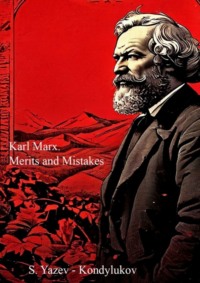Kitabı oku: «Karl Marx. Merits and mistakes»
Yandex translate Translator
© S. Yazev-Kondylukov, 2024
© Yandex translate, translation, 2024
ISBN 978-5-0062-7656-7
Created with Ridero smart publishing system
Karl Marx’s greatest achievement was that he discovered the dual nature of the labor process. Labor creates both consumer and exchange values. He discovered the dual nature of value itself: use value, exchange value.
He showed how, in the process of labor and exchange, one value passes into another. Consumer in exchange and vice versa. That is, he investigated the law of circulation and transformation of one form of value into another, the eternal cycle of values.
For the first time, unlike Adam Smith and Riccardo, Marx showed that the capitalist consumes not labor as such, but labor, the ability of the worker to work.
And this product, which is consumed in the labor market, has one very important property for a capitalist.
The consumed value, in the course of its consumption, produces not only a value equivalent to itself, but in the course of its consumption, in the course of the production process, it also produces surplus value. The source of the capitalist’s profit.
In addition, it was none other than Marx who for the first time showed and showed it brilliantly what labor is, gave a description of the labor process, regardless of any of its social forms.
It was Marx and Engels who discovered socio-economic formations as a set of productive forces and production relations inherent in a particular historical epoch.
They showed how and as a result of which one socio-economic formation is replaced by another.
They thought, after analyzing the experience of all revolutions, including the last French Revolution, that they had given humanity the keys to happiness, which consisted in the abolition of private ownership of the means of production.
In his writings, Marx often used Hegel’s philosophy, his teachings on contradictions, as engines of development.
Actually, Marxism grew out of Hegelianism, the founders themselves first called it real humanism.
One of the cornerstones of Marxism consists of the doctrine of the contradiction between the social nature of production and the private-property nature of its appropriation.
But this contradiction, as soon as we delve deeper into the essence of the matter, turns out to be a scholastic fiction.
Yes, production is becoming more and more social in nature – cooperation, integration, but this does not in the least interfere with the private-property nature of the appropriation of products obtained as a result of production.
As a result of the Great October Socialist Revolution, let’s call a spade a spade, there was no liberation of the working class, even within Russia, and then the USSR, I call it the Great Socialist Empire by analogy with the Roman Empire.
And the redistribution of commodity flows.
If earlier the capitalist, as the owner of the means of production, appropriated the entire product produced by the worker.
Now the entire product produced by the working class of Russia, and then the USSR, was appropriated by the state as the collective owner of the means of production, or rather the nomenclature, a special ruling class that appeared after the Socialist Revolution and which consisted mainly of the highest party elite.
Ücretsiz ön izlemeyi tamamladınız.
